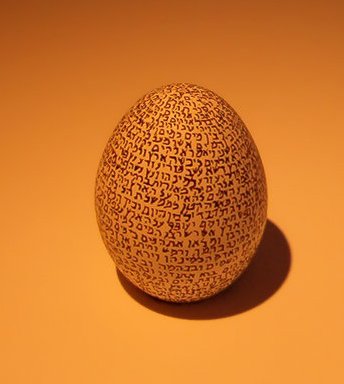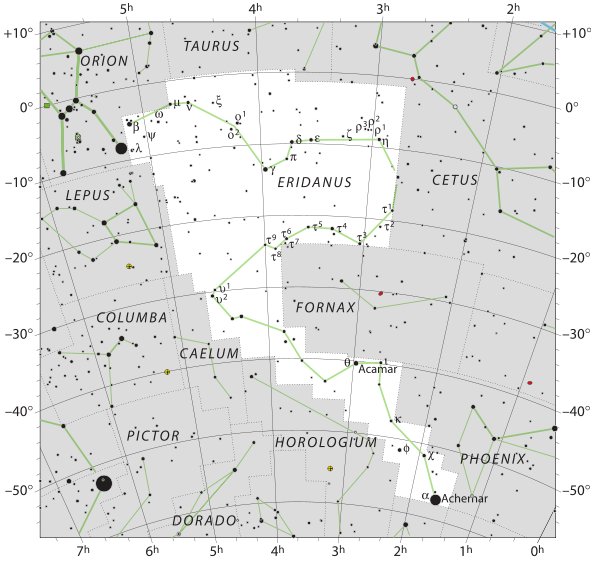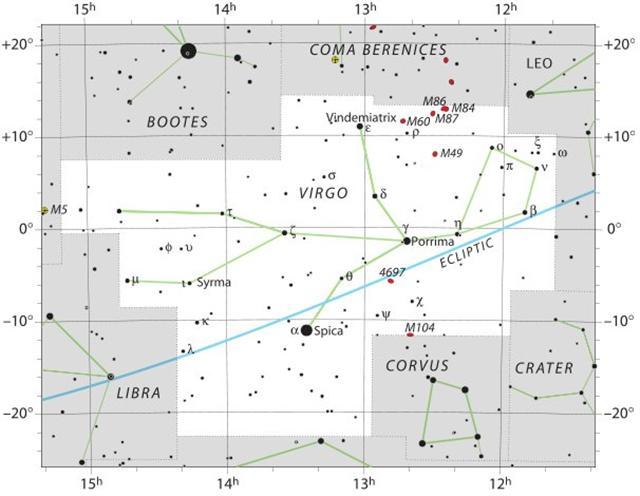At Bharani (Yoni) there was a radical change (a change from the roots so to say). Here all the uhi roots had been enumerated. ... Three hundred [etoru te rau] baskets of yam (came) from Maeha and Teke. Teke said to his assistants [ki tona titiro], 'Take the baskets on board the canoe!' [E:64]
Next [E:65-66] came 20 + 1 variants of sweet potato (kumara). Then Teke said to Oti, 'Go to your friend (hoou), to Pau (corrected for Bau) and ask [ka kī] for sweet potatoes (kuma), which he is to supply [ka avai mai]. And take even more baskets along when you go!' [ana oho koe] Oti got up [he ea a Oti] and left with all his companions. They took along a thousand [etahi piere] baskets. [E:64] Oti. To come to an end; to suffice, to be enough: ku-oti-á, it is finished; ina kai oti mo kai, there is not enough to eat; he-oti á, there isn't anymore left, it's the last one; it's enough with that. Vanaga. Ta.: 1. Oti, presage of death. Sa.: oti, to die. 2. To cut. Mq.: koti, oti, id. Sa.: 'oti, id. Ma.: koti, id. Churchill. Koti. Kotikoti. To cut with scissors (since this is an old word and scissors do not seem to have existed, it must mean something of the kind). Vanaga.Kotikoti. To tear; kokoti, to cut, to chop, to hew, to cleave, to assassinate, to amputate, to scar, to notch, to carve, to use a knife, to cut off, to lop, to gash, to mow, to saw; kokotiga kore, indivisible; kokotihaga, cutting, gash furrow. P Pau.: koti, to chop. Mgv.: kotikoti, to cut, to cut into bands or slices; kokoti, to cut, to saw; akakotikoti, a ray, a streak, a stripe, to make bars. Mq.: koti, oti, to cut, to divide. Ta.: oóti, to cut, to carve; otióti, to cut fine. Churchill. Pau.: Koti, to gush, to spout. Ta.: oti, to rebound, to fall back. Kotika, cape, headland. Ta.: otiá, boundary, limit. Churchill. Here the creators of Manuscript E saw it useful to change Pau into Bau in order to draw attention. The phoneme ba (the ancient Indo-European bha meant to become) was not in the Polynesian language.
Pau. 1. To run out (food, water): ekó pau te kai, te vai, is said when there is an abundance of food or water, and there is no fear of running out. Puna pau, a small natural well near the quarry where the 'hats' (pukao) were made; it was so called because only a little water could be drawn from it every day and it ran dry very soon. 2. Va'e pau, clubfoot. Paupau: Curved. Vanaga. 1. Hakapau, to pierce (cf. takapau, to thrust into). Pau.: pau, a cut, a wound, bruised, black and blue. 2. Resin. Mq.: epau, resin. Ta.: tepau, gum, pitch, resin. (Paupau) Hakapaupau, grimace, ironry, to grin. 3. Paura (powder), gunpowder. 4. Pau.: paupau, breathless. Ta.: paupau, id. 5. Ta.: pau, consumed, expended. Sa.: pau, to come to an end. Ma.: pau, finished. 6. Ta.: pau, to wet one another. Mq.: pau, to moisten. Churchill. Paua or pāua is the Māori name given to three species of large edible sea snails, marine gastropod molluscs which belong to the family Haliotidae (genus Haliotis), known in the USA as abalone, and in the UK as ormer shells ... Wikipedia There was a pair of them, Bau Nui and Bau Iti. They went and they came to the house of Pau Nui and Pau Iti. Pau Nui and Pau Iti said, 'What do you people (mahingo) want (?), what is going on?' Oti said to Pau Nui and Pau Iti, 'The king is sending me to get sweet potatoes, to bring them on board the canoe.' Pau Nui went out, pulled the sweet potatoes out of the ground and threw them to the side [ki te tapa]. While doing that he also enumerated the names of the sweet potatoes. [E:65] ... he ea a Bau nui.hee pakoo i te kumara he hoa ki te tapa.koia ko ingoa i nape tokoa ai.o te kumara ... Bau Nui enumerated them and gave them their proper names. He had 21 varieties of kumara and there were 19 dots embedded among them. But as yet I have no clue as to what that possibly could mean. Unless they represented 19 beans: ... Once upon a time there was an old woman who owned a great potato field (mara) where she planted her potatoes in spring and harvested them in autumn. She was famous all around for her many varieties of wonderful potatoes, and she had enough of them to sell at the market place. She planted her potatoes 7 in a row, placing her foot in front of her as a measure from one potato to the next. Then she marked the place with a bean - which would also give nourishment to the surrounding potatoes. Next she changed variety and planted 7 more followed by another bean, and this was the pattern she followed until all her 214 varieties had been put down in their proper places. She had drawn a map which she followed and from where each sort of potato could be located at the proper time for its harvest ...
Kumara. Sweet potato. The main varieties are: kumara pita, kumara rega moe tahi uriuri, kumara rega moe-tahi teatea, kumara rega vî'e, kumara aro piro, kumara paka taero, kumara ariga rikiriki, kumara uriuri, kumara ûka teatea, kumara ure omo, kumara ha'u pú, kumara ure omo uriuri. Vanaga. Sweet potato. P Pau., Mgv.: kumara, id. Mq.: kumaá, id. Ta.: umara, umaa, id. Churchill. By adding 21 (sweet potato variants) to 41 (Bharani) we should be able to reach right ascension day *62 at the time of rongorongo. And in the G text we can indeed see that Gb8-28 (corresponding to 20 he tua tea. - with a dot at the end of the name) is similar to Gb8-29 (20 he mamari kiakia.). Potatoes are formed like eggs, and therefore also they should be counted in groups of 20 (scores).
The idea of arranging the sweet potato variant 20 he mamari kia as number 20 + 1, i.e. separately from the first score, was surely to give a strong impuls for attention. And we can then understand it was in order to point at the Egg in the Eridanus river. Or rather to the pair of eggs (ο¹ and ο²), twins:
... If I am allowed to lift a page from The Golden Bough: each year the sylvan landscape of old New Zealand provided 'the scene of a strange and recurring tragedy.' In a small sweet-potato garden set apart for the god, a Maori priest enacted a sacred marriage that would be worthy of his legendary colleague of the grove of Nemi. Accompanying his movements with a chant that included the phrase, 'Be pregnant, be pregnant', the priest planted the first hillocks (puke, also 'mons veneris') of the year's crop. The priest plays the part of the god Rongo (-marae-roa, Ha., Lono), he who originally brought the sweet potato in his penis from the spiritual homeland, to impregnate his wife (Pani, the field). Mara. To start rotting, going bad (e.g. a lobster, a fish). See also mamara. Vanaga. Mgv.: mara, open land, cultivated field. Mq.: mara, maa, land under tilth. Ta.: amara, the first stone of a marae, etc. Sa.: mala, a new plantation. Ma.: mara, land under tilth. Churchill. Sa.: malae, the town green. Nukuoro: malae, a cleared space, an open place, a plantation. To.: malae, a gree, a grass plot ... Ha.: malae, smooth (as a plain) ... Ma.: marae, an inclosed place in front of a house. Ta.: marae, the sacred place of worship ... Vi.: mara, a burying place ... In note 261 I have advanced the opinion that malae is in form a conditional derivative of lae. This holds of the signification found in Nuclear Polynesia. The secondary sense which the Tongafiti carried to eastern Polynesia has obscured the lae element; but the sacrosanct content of the marae in the four-godded theology of eastern Polynesia is after all but a logical outgrowth of the Nuclear Polynesian malae as the civic center of social life where god is sole, surpreme - and Lucretian ... Churchill 2. During the period of growth, no stranger will be suffered to disturb the garden. But at the harvest, Rongo's possession is contested by another god, Tuu (-matauenga) - ancestor of man 'as tapu warrior' - in a battle sometimes memorialized as the origin of war itself. Rogo. Rogorogo: Originally, 'orators, bards' of Mangareva. Borrowed into the Rapanui language in 1871, it came to generically signify the wooden tablets incised with glyphs, the writing system itself, and the respective inscriptions. Earlier the term ta was used for the writings. Fischer. Mgv.: rogouru, ten. Mq.: onohuu, okohuu, id. Churchill. LONO, v. Haw., to hear, observe, obey; pass., it is said, reported; s. report, fame, tidings. Sam., longo, to hear, report; s. sound; longoma, to hear; longonoa, be deaf; longo-longoa, be famed, renowned. Tah., roa, report, fame, notoriety; pa-roo, famous; tui-roo, id. Marqu., ono or oko (k for ng), sound, to hear. N. Zeal., rongo, to hear, to sound, report, news. Tong., ongo, sound, tidings. Fiji., rongo, id. Iaw., runu, to hear. By the usual sound exchange of l and n, perhaps the Haw. nana, to bark, to growl, and the N. Zeal. nganga, noise, uproar, refer themselves to this family. Sanskr., ran, to shout, to sound; rana, noise; rana-rana, mosquito. Pers., lânah, cry, noise; lândan, to cry, to bark; ka-rânah, a raven. Irish, lonach, talkative, a babbler; lon, a blackbird; r'an, ranach, a cry, roarings. Lat., rana, frog. A. Pictet (Orig. Ind.-Eur., i. 474) refers the Greek κορωνη, a crow, a jackdaw, to the Sanskrit ran. Perhaps the Swedish röna, to be aware of, to experience, apprendre, goes back to the Polynesian lono or the Sanskrit ran. Fornander.
Using an unworked branch of the
mapou tree - should we not thus say, a bough broken from a sacred
tree? - a second priest, representing Tuu, removes, binds up, and
then reburies the first sweet-potato tubers. He so kills Rongo, the
god, parent and body of the sweet potato, or else puts him to sleep, so that
man may harvest the crop to his own use. Colenso's brilliant Maori informant
goes on to the essentials of the charter myth:
Rongo-marae-roa (Rongo
as the sweet potato) with his people were slain by Tu-matauenga (Tuu
as warrior) ...
Tu-matauenga also
baked in an oven and ate his elder brother Rongo-marae-roa so that he
was wholly devoured as food. Now the plain
interpretation, or meaning of these names in common words, is, that
Rongo-marae-roa is the kumara (sweet potato), and that
Tu-matauenga is man ...
Roa. Long: haga roa, long bay,
wide beach; ara roa râkei, wide, neat
path. Roaroa, long, tall, far, distant:
tagata roaroa, tall man; kaiga roaroa,
distant land; roaroa tahaga, middle
finger. Vanaga. Long, large, extent; roaroa,
to grow, height; mea roaroa, a long
while; roaroa tahaga, middle finger;
roaroa ke, infinite (time and space);
roroa, far, distant, thin, to grow tall;
tagata roroa, giant; roroa ke,
immense; arero roroa, to rapport, to
tell; vanaga roroa, to chatter, babbler;
vare roroa, driveller; hakaroa, to
lengthen, to defer; hakaroaroa, to
lengthen, to develop; hakaroroa, to
extend, prolong, defer, lengthen; roaga,
distance, extent, size, length, distant, long.
Churchill.
... the Hawaiians had a
sweet-potato ritual of the same general structure as the Maori cycle. It was
used in the fields of Kamapua'a, name of the pig-god said by some
to be a form of Lono, whose rooting in the earth is a well-known
symbol of virile action.
While the crops were growing, the garden was tabu,
so that the pig could do his inseminating work. No one was allowed to throw
stones into the garden, thrust a stick into it, or walk upon it - curious
prohibitions, except that they amount to protection against human attack. If
the garden thus belonged to Lono, at the harvest the first god
invoked was Kuu-kuila, Ku-the-striver.
The 21st variant was not a
sweet potato but the egg of a bird, Kiakia.
... The transference of the
name for sweet potatoes, kumara, to a sea
bird (Oestrelata incerta or
Oestrelata leucoptera) presents a
problem in taxonomy. In a short recitation that
accompanies the string game, the next bird on
the list, kiakia, the white tern, is
associated with the leaves of the sweet potato
...
At right ascension day *196
(at the time of rongorongo) was Vindemiatrix
- the Grape Gatherer. 28 * 7 = 196.
|
|||||||||||||||||||||||||||||||||||||||||||||||||||||||||||||||||||||||||||||||||||||||||||||||||||||||||||||||||||||||||||||||||||||||||||||||||||||||||||||||||||||||||||||||||||||||||||||||||||||||||||||||||||||||||||||||||||||||||||||||||||||||||||||||||||||||||||||||||||||||||||||||||||||||||||||||||||||||





